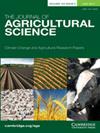植物育种中的分子标记
IF 1.7
4区 农林科学
Q2 AGRICULTURE, MULTIDISCIPLINARY
引用次数: 0
摘要
分子标记是植物育种的重要工具。自20世纪80年代以来,随着技术的发展,分子标记方法进一步多样化。新一代测序和高通量植物表型的建立大大减少了对大量个体进行基因分型的时间。对于不太熟悉分子育种技术的育种人员,希望了解分子育种技术的最新进展,本文将为他们提供基础知识。每种分子标记技术都有其特定的优点和局限性。探讨了分子标记类型、多样性研究、QTL定位、关联定位、标记辅助回交和基因组选择。介绍了标记在植物育种中的应用。在基因组中,分子标记可以检测性状的遗传结构,也可以识别候选基因,在植物育种计划中发挥重要作用。本文章由计算机程序翻译,如有差异,请以英文原文为准。
Molecular Markers in Plant Breeding
Molecular markers are an important tool for plant breeding. Since the 1980s, in response to the technology development, molecular marker approaches have been further diversified. The establishment of new-generation sequencing and high-throughput plant phenotyping has greatly decreased the time to genotype large numbers of individuals. For breeders who are not very familiar with molecular techniques and want to catch up with the advances in the field, this review offers basic knowledge. Each molecular marker technology has specific advantages as well as limitations. Molecular marker types, diversity studies, QTL mapping, associative mapping, marker-assisted backcrossing and genomic selection are explored. Marker application in plant breeding is also described. In the genome, molecular markers can detect the genetic architecture of a trait, but also identify candidate genes with an important role in plant breeding programs.
求助全文
通过发布文献求助,成功后即可免费获取论文全文。
去求助
来源期刊

Journal of Agricultural Science
农林科学-农业综合
CiteScore
2.80
自引率
5.00%
发文量
68
审稿时长
1.4 months
期刊介绍:
The Journal of Agricultural Science publishes papers concerned with the advance of agriculture and the use of land resources throughout the world. It publishes original scientific work related to strategic and applied studies in all aspects of agricultural science and exploited species, as well as reviews of scientific topics of current agricultural relevance. Specific topics of interest include (but are not confined to): all aspects of crop and animal physiology, modelling of crop and animal systems, the scientific underpinning of agronomy and husbandry, animal welfare and behaviour, soil science, plant and animal product quality, plant and animal nutrition, engineering solutions, decision support systems, land use, environmental impacts of agriculture and forestry, impacts of climate change, rural biodiversity, experimental design and statistical analysis, and the application of new analytical and study methods (including genetic diversity and molecular biology approaches). The journal also publishes book reviews and letters. Occasional themed issues are published which have recently included centenary reviews, wheat papers and modelling animal systems.
 求助内容:
求助内容: 应助结果提醒方式:
应助结果提醒方式:


